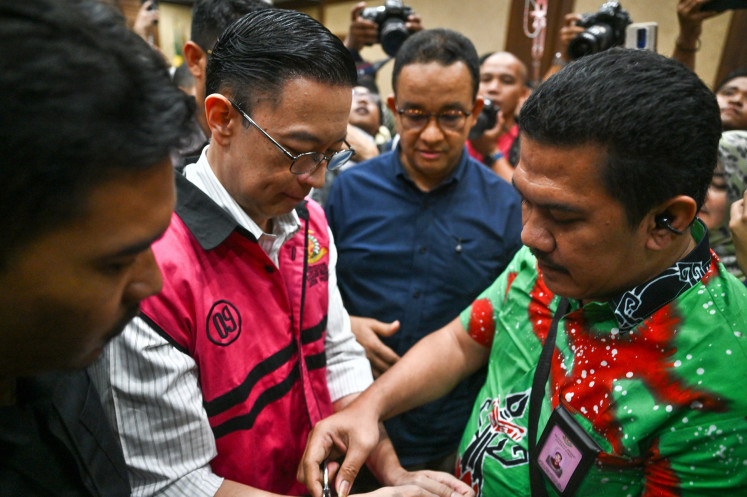Popular Reads
Top Results
Can't find what you're looking for?
View all search resultsPopular Reads
Top Results
Can't find what you're looking for?
View all search resultsChildren of landfill scavengers learn about life, values
Tongue twisting time: Volunteer Lawrence Blackman from Britain teaches English at the Biji-Biji Bantar Gebang (BGBJ), an informal school for the children of scavengers at the Bantar Gebang landfill in Bekasi, West Java
Change text size
Gift Premium Articles
to Anyone
T
ongue twisting time: Volunteer Lawrence Blackman from Britain teaches English at the Biji-Biji Bantar Gebang (BGBJ), an informal school for the children of scavengers at the Bantar Gebang landfill in Bekasi, West Java.(Courtesy of Resa Boenard/BGBJ)
About 30 children gathered on a recent Sunday in a small wooden house for their weekly English, drawing and yoga classes. The breeze blew a stench in from the mountains of garbage nearby.
The classes were a break from the children’s daily routine of helping their parents eke out a living as scavengers at Bantar Gebang, the largest landfill in the country. An estimated 6,000 scavengers rely on the 110-hectare dump for income.
The sheer stink can ward off unsuspecting strangers. Fat flies swarm all over the place. Roaring oversized dump trucks come and go.
Welcome to Biji-Biji Bantar Gebang (BGBJ), an informal school founded to help children of the impoverished scavengers catch up with modernity.
Activist Resa Boenard says she helped found the free school in 2014 out of concern about rampant child marriage. That is why teachers try to instil in students the understanding that child marriage is bad.
She recalls her family moved to Bantar Gebang years before the area was turned into a landfill in 1989. “Something told me I had to do something about it. This is my neighborhood.”
The school has no set curriculum. Subjects may range from health, nutrition and sports to art.
Resa loves to call the school a “community” where children are free to “come and have fun” without having to register.
The Indonesian word biji-biji (seeds) is used to mean that the school treats the students as “seeds of the future”. In the landfill community, education is the last thing that comes to people’s minds that are already preoccupied with meeting bare necessities.
Founders of the informal school also saw vulnerabilities, especially among the young children, to exploitation, especially prostitution. This has compelled them to offer alternative subjects such as personal development to boost their self-esteem. This is what makes the school different from the formal ones that emphasize cognitive development.
“We aim to provide alternatives for young people, giving them the tools and knowledge to break the poverty cycle and create a healthy and safe environment for themselves and their families,” the community writes on its website.
Children at the landfill are vulnerable to bullying because of their families’ low economic status, so they need to be empowered, Resa says. Even she herself falls victim to harassment. At her college, some call her “The Queen of Bantar Gebang”.
“I wouldn’t take the bully seriously, but not all children are be able [to cope with it],” she says.
BGBJ has some computers for the children to learn IT, but the problem is that no internet provider is willing to extend their services there; they will not take a risk of installing fibre optic cables through the garbage area. On IT, Resa says she wants to teach the children how to create a blog through which they can practice writing.
The school relies on volunteers who are willing to work for nothing. Among the instructors are foreign nationals who teach English. Lawrence Blackman is an Englishman who volunteers to teach his native language. Sometimes, he dances to entertain the kids.
Blackman, who intends to stay for a month with the landfill kids, says an informal school like BGBJ is important for children to learn “values” and “life”, the things the children might not get from formal education.
“A value is not [something] to learn from the book,” he says. “The two [formal and informal education] are working together.”
Dannie, a volunteer from China, is impressed with how the scavengers’ children enjoy life, without the luxury of toys or gadgets that well-off children cannot do without.
“They happily make do with simple things,” she says, showing photographs of children playing by piles of garbage at the landfill. “They have hope.”
Unfortunately, the presence of foreign nationals has led local Muslims to suspect them of “Christianization” of the children.
“It is a funny accusation. They should have asked the children if Christianity is taught,” says Resa, who is a Muslim.
So far, the allegations have yet to adversely affect the educational activity, something that is not envisioned by the government authorities now busy seeking fabulously high garbage disposal fees from Jakarta.










